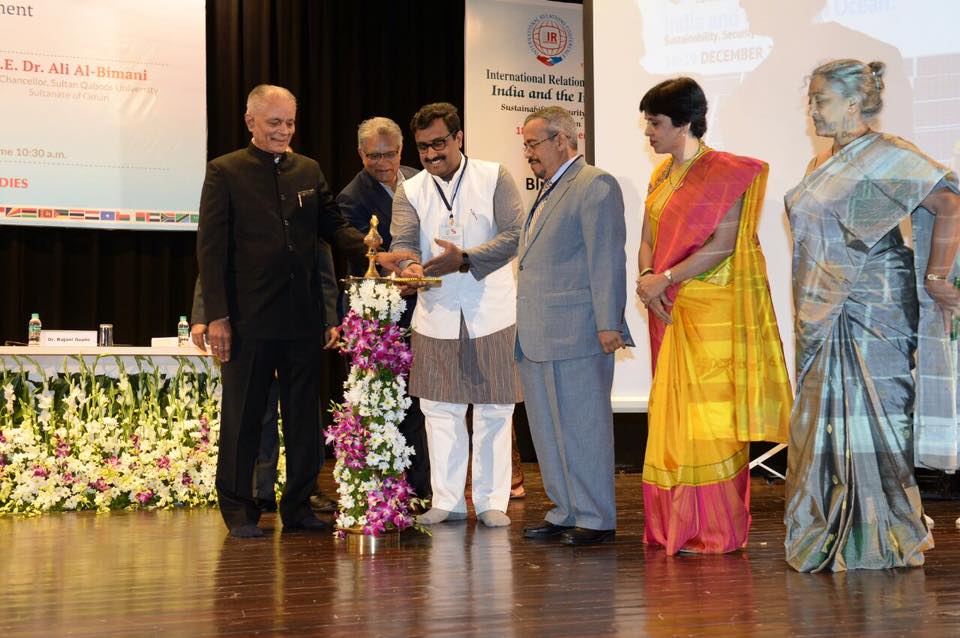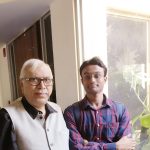TEXT OF RAM MADHAV (NATIONAL GENERAL SECRETARY , BJP AND DIRECTOR, INDIA FOUNDATION) INAUGURAL ADDRESS AT THE INTERNATIONAL CONFERENCE ON ‘INDIA AND THE INDIAN OCEAN’ BY SYMBIOSIS INTERNATIONAL UNIVERSITY AT PUNE ON 18-12-2016
Elite Domain?
Foreign policy is considered in India as an elite domain, not something for ordinary folks. Conferences like this will help larger national community understand India’s diplomatic imperatives and endeavours. Foreign policy is too important to be left alone to the diplomats.
Diplomacy is Dynamic
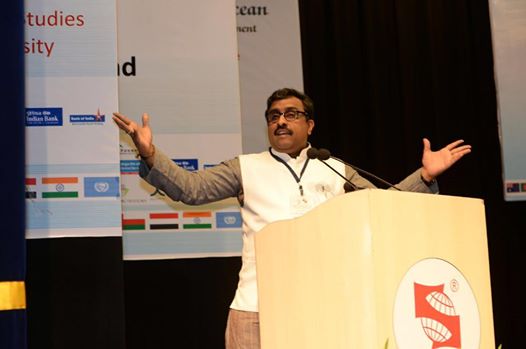 I am happy that this conference has taken up a topic of high contemporary relevance. “Nations have no permanent friends or allies; they have only permanent interests”, said famous English statesman Lord Palmerston. Henry Kissinger took it one step forward and said, “America has no permanent friends or foes; it has only permanent interests”. What it implies is that diplomacy is a dynamic subject. Nations need to constantly evaluate and re-evaluate their preferences in the international arena and strategise. There is no place for romanticism in diplomacy. It has to be cold-blooded and utterly pragmatic.
I am happy that this conference has taken up a topic of high contemporary relevance. “Nations have no permanent friends or allies; they have only permanent interests”, said famous English statesman Lord Palmerston. Henry Kissinger took it one step forward and said, “America has no permanent friends or foes; it has only permanent interests”. What it implies is that diplomacy is a dynamic subject. Nations need to constantly evaluate and re-evaluate their preferences in the international arena and strategise. There is no place for romanticism in diplomacy. It has to be cold-blooded and utterly pragmatic.
Romanticism or Pragmatism?
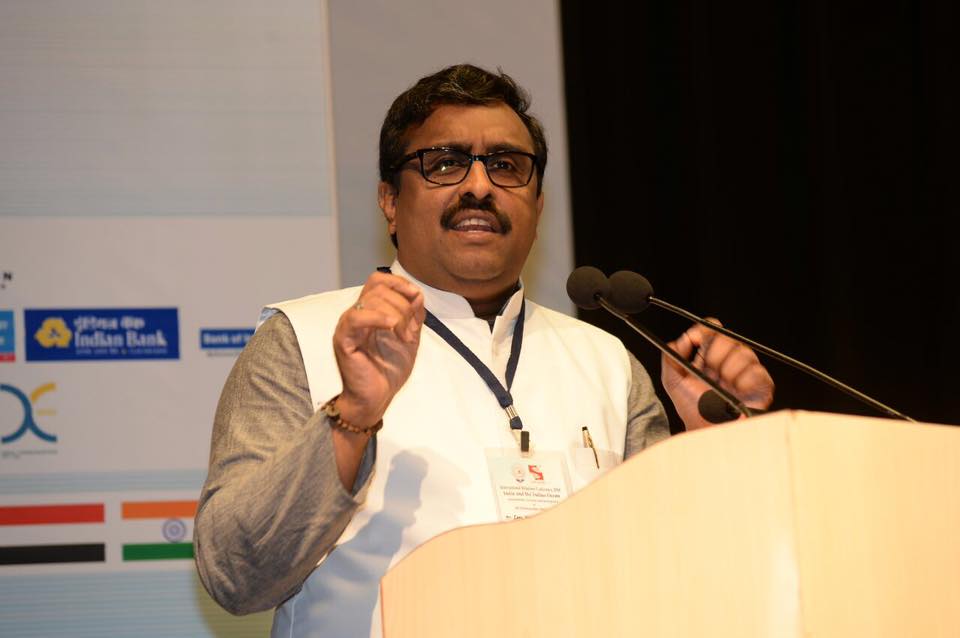 We Indians have great vanity for romantic slogans. This romanticism has cost us dearly in our international relations. Even today we don’t seem to be fully out of it. When the US Secretary of Defence Aston Carter called at the Shangri La dialogue this year for the emergence of an inclusive “principled security network” that “represents the next wave in Asia-Pacific Security”, we immediately lapped it up. Some scholars started saying that India would be not merely a participant in that ‘principled security network’, but will lead it.
We Indians have great vanity for romantic slogans. This romanticism has cost us dearly in our international relations. Even today we don’t seem to be fully out of it. When the US Secretary of Defence Aston Carter called at the Shangri La dialogue this year for the emergence of an inclusive “principled security network” that “represents the next wave in Asia-Pacific Security”, we immediately lapped it up. Some scholars started saying that India would be not merely a participant in that ‘principled security network’, but will lead it.
Nobody sat up and asked Carter as to what was the ‘principle’ that he was referring to. Carter is gone today, and with him the ‘principle’ that he was talking about. Trump’s foreign policy is going to be violently different from that of Obama, Hillary and Carter.
Pragmatism, not romanticism, demands that we talk about the Indian Ocean region more. India’s foreign policy has long been tilted westward. Time we turned eastward. I congratulate the Symbiosis International University for taking up this most important topic of the century – India and the Indian Ocean Region – for this conference.
21st Century Alliances
21st Century politics is going to be markedly different from the previous century. The global power axis has today shifted away from the Pacific-Atlantic region to the Indo-Pacific region. That brings tectonic shifts in world politics. Many institutions will become irrelevant. 20th Century power alliances like the NAM, Commonwealth etc have become redundant. The European Union is imploding. The NATO is more or less dead, waiting for the last rites to be performed by Donald Trump and Vladimir Putin jointly.
Indian Ocean – Power Axis
In their place new power alliances are emerging. The epicentre of these new alliances is going to be the Indo-Pacific region. Asia is today home to some of the world’s leading and fast growing economies. 45% of the world’s population lives here. Half of world’s container traffic and one-third of bulk cargo traverses the Indian Ocean. Around 40 per cent of the world’s offshore oil production comes from the Indian Ocean. Nearly half of the world’s energy supplies take place through this region.
Strategically also Asia has emerged as a nerve centre. Asia’s defence spending is now larger than Europe’s. Reports indicate that in 2014, military spending in Asia increased by five per cent, reaching around $439 billion in total, compared to spending in Europe which grew by 0.6 per cent, reaching around $386 billion in total.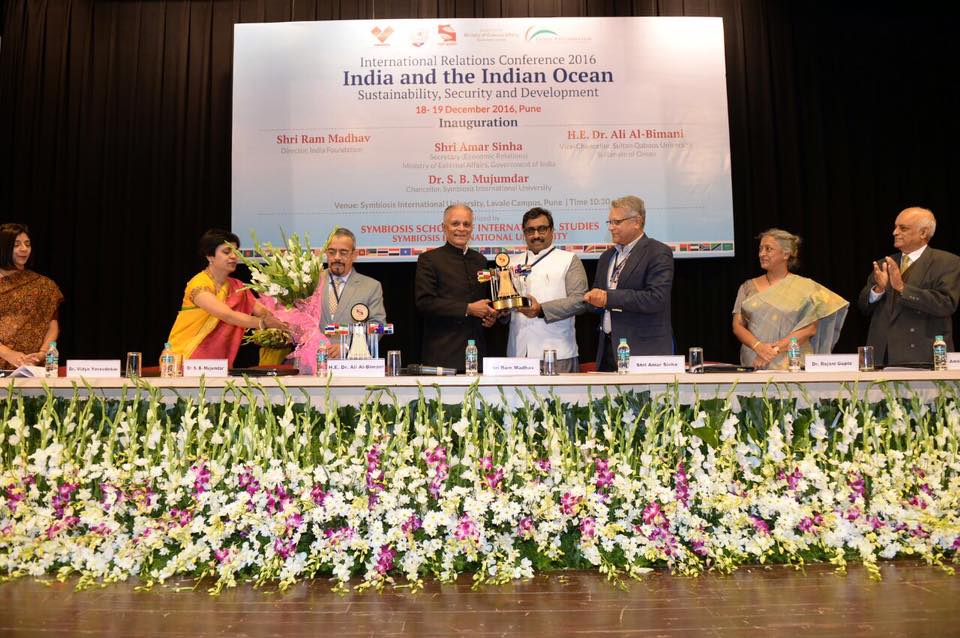
Half of the world’s submarines will be seen roaming around in the Indo-Pacific region in the next two decades. Within the same period, at least half of the world’s advanced combat aircraft armed with extended range missiles and supported by highly sophisticated information networks, will be operated by countries in the Indo-Pacific belt.
Longer-range precision-guided missiles, including ship-based missiles; advanced intelligence, surveillance and reconnaissance systems, including both space and high altitude capabilities, reducing the effectiveness of stealth capabilities; autonomous systems, such as unmanned combat vehicles, in operation in the sub-surface, surface and air environments – this will be the future scenario of the region.
A study by Australia indicates that: “Over the next two decades, other technological advances such as quantum computing, innovative manufacturing, hypersonics, energy weapons and unmanned systems are likely to lead to the introduction of new weapons into our region. By 2035, more countries in our region will have access to ballistic missile technology and it is possible more countries may have acquired them. The next 20 years will see the continuing expansion of space-based and space-enabled capabilities, including military capabilities.”
India, China and US
This region will witness power play between three major powers. China and India are the powers in the region. And the third player will be the USA. India and China are the two fast growing economies in the region. Both nurture big power ambitions. Both compete for the same resources. Hence competition is imminent between the two.
China, with its bigger financial and military muscle, is seemingly ahead of India in the region today. It is in the driver seat of many new transnational trade alliances like AIIB, BRICS and the recent Regional Comprehensive Economic Cooperation (RCEP) alliance. It is aggressively pursuing ambitious infrastructure projects like Belt and Road, Maritime Silk Route etc. It’s efforts to emerge as the leading naval power in the region seem to be coming to fruition. In no time it has built a formidable navy with over 300 vessels of various sizes.
The future of America’s role in the region is uncertain.  President-elect Donald Trump doesn’t share the vision of his predecessors in this matter. President Obama launched an ambitious alliance of the nations of the Indo-Pacific region by name Trans Pacific Partnership (TPP). The document was finally signed by the twelve partner countries including the US in February 2016 at Brisbane, New Zealand. But Trump is not enthusiastic about it at all. The TPP may not get the obligatory ratification from the US Congress. At the Halifax Security Conference the PASCOM chief Adm. Harris called TPP as ‘more or less dead’. It signals diminishing influence of the US in the region.
President-elect Donald Trump doesn’t share the vision of his predecessors in this matter. President Obama launched an ambitious alliance of the nations of the Indo-Pacific region by name Trans Pacific Partnership (TPP). The document was finally signed by the twelve partner countries including the US in February 2016 at Brisbane, New Zealand. But Trump is not enthusiastic about it at all. The TPP may not get the obligatory ratification from the US Congress. At the Halifax Security Conference the PASCOM chief Adm. Harris called TPP as ‘more or less dead’. It signals diminishing influence of the US in the region.
Indo Pacific
India has great power ambitions. Prime Minister Modi has openly talked about India’s ‘ambition to rise as an influential and responsible global power’. In order to realise them India has to change gears and proactively engage in the region. Without causing any disequilibrium we need to assert our position in the region. One of the first measures should be to bring in the required nomenclature into vogue. Asia – Pacific is a phrase coined during 60s and 70s of the last century when Asian powers like Japan and Singapore were raising and it suited America to bond with them. But today it is India and other Indian Ocean neighbourhoods that are emerging as the powerhouses. Some scholars in the West started using the phrase ‘Indo-Asia Pacific’. We need to call it Indo – Pacific implying the centrality of the Indian Ocean to the region.
Prime Minister Modi has started many initiatives in the direction of asserting India’s proactive role in the region. Greater bilateral engagement with countries in the region, enhanced interface with the regional groupings like ASEAN, South Pacific Island Nations group etc and keenness to play a role in the regional disputes shedding the trademark reticence are some of the visible actions that Modi has taken.
De-Hyphenation
De-hyphenation of bilateral relations is another major step taken by Modi in this direction. Our engagements with countries like America, Russia and China are based on stand alone bilateral interests without conflicting with our relations with either of them or any other country.
Indian Navy
India has to strengthen its naval power if it really wants to play a bigger role in the region. Towards that end steps have been taken by the new government. A target of securing 200 vessels for our Navy was put for 2030. We have expanded Malabar Exercise to include Japan as the third member besides India and US. We need to think of expanding our sphere of influence through strategic ports like Chabahar, Trincomalee, Sittwe etc.
Technology
We still have to go a long way. We live in an unstable neighbourhood, the challenge of which needs to be handled diligently. Technology – digital and cyber – is going to play a big role. India, with its vast tech manpower and demographic dividend, can take advantage of this.
US – Uncertainties
India is going to face a new challenge in the form of changed US priorities. Under Donald Trump the priorities of the US appear changing fast that will affect the regional balance in Asia. Especially his future relationship or rivalry with countries like Russia, China, Saudi Arabia and India is going to change the power dynamic in the region drastically. We need to be alert to these challenges in the region.
Hillary Clinton, during her visit to India in 2011, has called for India to assume a greater role in its region. “We encourage India not just to look east, but to engage east and act east as well,” she said. “India’s greater role on the world stage will enhance peace and security,” she added in an essay in Foreign Policy magazine.
Stage for playing that role is set in the Indian Ocean Region. India has the resources, the capability and most importantly the leadership with will power to play that role. What we need is ideas and I am sure this conference will throw up some such path breaking ideas.
SOURCE : official page of Shri Ram Madhav, National General Secretary, Bharatiya Janata Party (BJP); Director, India Foundation.
